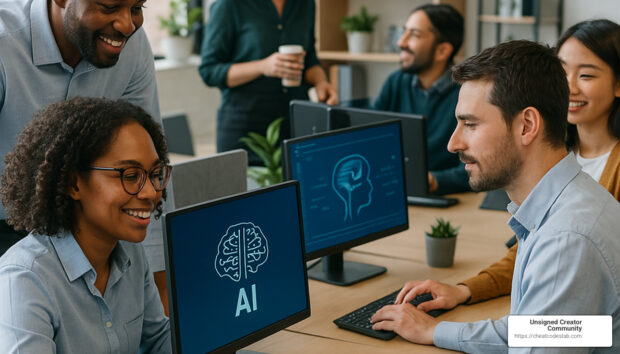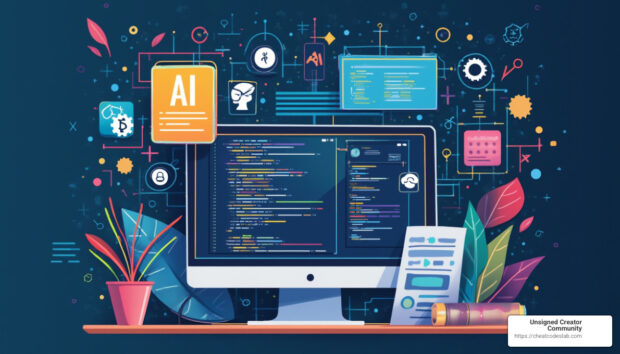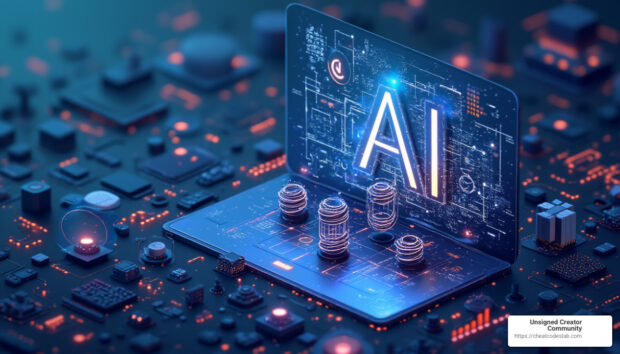
Will ai replace digital marketers? This question buzzes around boardrooms and brainstorm sessions as AI technology advances by leaps and bounds.
To immediately clarify:
🔹 AI will not replace digital marketers.
🔹 AI will automate routine tasks.
🔹 AI will augment— not replace— creative and strategic jobs.
Why is AI such a game-changer in marketing? AI excels in automation, freeing up digital marketers to focus on high-value, strategic work. Automation tools can handle repetitive tasks like data collection and analytics, dramatically improving efficiency. This allows marketers to devote their time to creative and strategical endeavors that truly require human insight.
However, AI isn’t perfect. It lacks the emotional intelligence and creative flair that are the bedrock of effective marketing campaigns. Human creativity brings a nuanced understanding of consumer behavior and emotional connection that AI simply can’t replicate.
I’m digitaljeff, and I’ve spent over 20 years in tech and digital media. I’ve seen how AI impacts the marketing world. AI tools can streamline processes, but to answer the burning question ‘will ai replace digital marketers’: No, AI will not replace us. It will make us more efficient and creative.

Let’s explore how AI integrates into our roles, enhancing rather than diminishing our creative power.
The Role of AI in Digital Marketing
AI and Creativity
AI isn’t here to replace the creative spark; it’s here to improve it. Think of AI as a powerful assistant that helps digital marketers create more engaging and interactive content. For example, AI can analyze vast amounts of data to generate fresh ideas based on user behavior and preferences. This means marketers can take their campaigns to new heights, drawing inspiration from patterns and insights that would take humans years to uncover.
Imagine having access to billions of web pages and years’ worth of data about what people like or dislike online. AI can provide this kind of insight, helping marketers brainstorm new content ideas or even write initial drafts. Platforms like ChatGPT are already being used by 44% of marketers for content creation and ideation in 2024, identifying content gaps and developing potential writing outlines.
AI in Routine Tasks
AI shines in automating routine tasks, allowing marketers to focus on more strategic and creative work. Here are some ways AI is revolutionizing these tasks:
-
Data Collection and Analysis: AI can gather and analyze data in the blink of an eye, making it easier for marketers to draw conclusions and make data-driven decisions. This frees up time to focus on strategy and creativity.
-
Online Customer Service: AI-powered chatbots can handle simple customer service queries 24/7, freeing up human representatives to tackle more complex issues. This not only improves efficiency but also improves customer satisfaction.
-
Campaign Optimization: AI can automatically adjust bids, targeting, and other parameters in real-time to optimize ad performance. This kind of dynamic creative optimization ensures that marketing campaigns are always performing at their best.
-
Content Generation: AI tools can help create initial drafts of content, suggest headlines, and even generate social media posts. This allows marketers to focus on refining and perfecting the content, rather than starting from scratch.

Efficiency and Consumer Insights
AI doesn’t just automate tasks; it also makes them more efficient. By analyzing consumer data, AI can provide actionable insights into audience segmentation and personalized content recommendations. For instance, machine learning algorithms can predict future consumer behavior based on past interactions, helping marketers tailor their strategies more effectively.
Companies like Amazon and Walmart have successfully used AI to improve their campaign performance while reducing costs through automation. This shows that AI can provide significant benefits even for smaller businesses that may not have the resources for large teams of data scientists.

Enhancing, Not Replacing
In conclusion, AI is a tool that improves the capabilities of digital marketers rather than replacing them. It automates mundane tasks, provides valuable insights, and even assists in content creation. However, the emotional intelligence, creativity, and strategic thinking that human marketers bring to the table are irreplaceable.
As we steer this evolving landscape, it’s clear that AI will continue to play a crucial role in digital marketing. But to answer the question, “will AI replace digital marketers?”—the answer is a resounding no. AI will make us more efficient, more insightful, and ultimately, more creative.
Let’s dive deeper into the future of digital marketing with AI and how it will shape our roles and strategies.
Will AI Replace Digital Marketers?
AI’s Limitations
Despite the impressive capabilities of AI, it has notable limitations that prevent it from fully replacing digital marketers. One of the most significant constraints is the lack of emotional intelligence. While AI can analyze data and generate content, it struggles to understand and replicate genuine human emotions. This emotional gap means that AI cannot create content that resonates on a deeply personal level with audiences.
Moreover, AI lacks the nuanced understanding of human behavior and cultural contexts. This deficiency makes it challenging for AI to interpret subtle cues and contextual factors that are crucial in crafting effective marketing strategies. Building lasting relationships with customers requires empathy and the ability to connect on a human level—something AI simply cannot do.
For example, while AI-powered chatbots can handle routine customer service queries, they often falter when faced with complex or emotionally charged issues. Human customer service representatives excel in these situations because they can empathize and provide personalized solutions, strengthening the customer relationship.
AI as a Tool, Not a Replacement
AI should be viewed as a powerful tool that improves the capabilities of digital marketers rather than replacing them. By automating mundane tasks and providing decision support, AI allows marketers to focus on more strategic and creative endeavors.
Enhancing Abilities: AI can assist marketers by providing data-driven insights that inform strategic decision-making. For instance, AI can analyze consumer behavior to predict trends, helping marketers tailor their campaigns more effectively. This kind of support enables marketers to make informed decisions quickly and accurately.
Mundane Tasks: Automating routine tasks like data collection, analytics, and basic customer service frees up valuable time for marketers to concentrate on more impactful activities. For example, AI can handle the initial stages of content generation, such as drafting articles or suggesting headlines, allowing marketers to focus on refining and perfecting the content.
Decision Support: AI can also serve as a decision support tool, offering recommendations based on data analysis. However, the final decision-making still relies on human judgment. Marketers bring creativity, empathy, and strategic thinking to the table—qualities that AI cannot replicate.
AI is an enabler that amplifies human potential. It helps marketers achieve their goals more efficiently and effectively but does not replace the human touch that is crucial for building meaningful connections with audiences.
It’s clear that AI will continue to play a significant role in digital marketing. However, the question “will AI replace digital marketers?” can be answered with a confident no. AI will make us more efficient, insightful, and creative, but the human elements of empathy, creativity, and strategic thinking will always be indispensable.
Let’s dive deeper into the future of digital marketing with AI and how it will shape our roles and strategies.
The Future of Digital Marketing with AI
AI and Job Evolution
AI is changing the landscape of digital marketing, but rather than eliminating jobs, it is reshaping them. As AI takes over repetitive and mundane tasks, new roles are emerging that require human creativity, emotional intelligence, and strategic thinking. For example, marketers are now focusing more on data interpretation, creative strategy, and ethical oversight.
New Job Creation: AI is creating opportunities for roles like AI specialists, data analysts, and strategic consultants. These positions require a deep understanding of AI tools and how to leverage them effectively within marketing strategies. Small businesses, in particular, benefit from AI by automating tasks they couldn’t handle before, allowing them to compete with larger companies.
Skill Adaptation: Marketers must adapt by learning new skills related to AI and data analytics. According to a Forbes article, forward-thinking marketers are already embracing AI to improve their capabilities. Training in AI tools and understanding their applications will be crucial for staying relevant in the industry.
Ethical Use: With great power comes great responsibility. As AI becomes more integrated into marketing, ethical considerations become paramount. Marketers must ensure that AI applications are used responsibly, avoiding biases and ensuring transparency in how data is collected and used.
Embracing AI for Success
To fully harness the potential of AI, marketers need to accept its capabilities and integrate them into their strategies thoughtfully.
Learning AI: Continuous learning is essential. Marketers should invest time in understanding how AI works and how it can be applied to their specific needs. This includes familiarizing themselves with tools for automation, data analysis, and content generation.
Ethical Considerations: AI should be used ethically to build trust with consumers. This involves being transparent about AI’s role in marketing processes and ensuring that data privacy is maintained. Ethical AI use is not just a moral imperative but also a competitive advantage, as consumers increasingly value transparency and honesty.
Strategic Implementation: The key to successful AI integration is strategic implementation. AI can provide significant insights and efficiencies, but it must be aligned with broader marketing goals. Marketers need to identify areas where AI can add the most value and integrate it in ways that complement human efforts. For example, using AI for data analysis can free up time for marketers to focus on creative strategy and customer relationship building.
In conclusion, AI is not a replacement for digital marketers but a powerful tool that, when used correctly, can improve their capabilities and open up new opportunities. By embracing AI, marketers can stay ahead of the curve and drive innovation in their strategies.
Next, we will explore how AI trends and future applications will continue to shape the digital marketing landscape, offering new possibilities and challenges for marketers.
Conclusion
AI’s complementary role in digital marketing is undeniable. It excels at automating mundane tasks, analyzing vast amounts of data, and providing actionable insights. However, will AI replace digital marketers? The answer is a resounding no.
Human Creativity: AI can’t replicate the creativity and emotional intelligence that humans bring to the table. Crafting compelling stories, building genuine relationships, and making strategic decisions require a human touch that AI simply can’t emulate.
AI as a Tool: Instead of replacing digital marketers, AI acts as a powerful tool that improves our abilities. By taking over repetitive tasks, AI frees us up to focus on what we do best—thinking creatively and strategically. This allows us to deliver more value to our clients and stay ahead in a competitive landscape.
At Unsigned Creator Community, we believe in using AI to complement human creativity. Our goal is to empower marketers with the tools and knowledge they need to integrate AI seamlessly into their strategies, ensuring a balanced approach that leverages the best of both worlds.
For more insights and resources on how to effectively use AI in your marketing efforts, visit our AI Courses.
By embracing AI responsibly and strategically, we can open up new opportunities and drive innovation in digital marketing. The future is bright, and together, we can steer it successfully.















